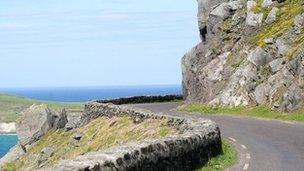Holidays, health cards, travel insurance and you
- Published

Holidaymakers face a long, expensive road home if they are hurt and do not have cover
Each year, more than 45 million UK residents head off overseas either on holiday, business, visiting friends and relatives, or to study.
With so many of us going abroad, often for long periods of time, there is always the possibility that you or one of your family members might need medical treatment at some stage.
For UK residents travelling to Europe, the European Health Insurance Card (EHIC) is a useful addition to travel insurance.
How the card works
The EHIC was first introduced in 2006 and replaced the E111 form. It gives the card holder access to state medical care in all 27 countries of the European Union and the four members of the European Free Trade Area - Lichtenstein, Iceland, Norway and Switzerland.
The thinking behind the scheme is that access to state medical care should be available throughout the entire EU to all EU citizens.
However, in practice, if your condition can be treated back in your country of origin, it should be, because the EHIC and E111 were not introduced to encourage medical tourism in which people specifically travel to member states to obtain medical treatment.
An EHIC does cover pre-existing medical conditions and routine maternity care, as long as you are not specifically going abroad with the intention of giving birth overseas.
Exclusions
The EHIC card does not provide you with cover outside of the 31 countries of the EU and EEA. There is some public confusion here. In the past Abta has come across examples of visitors to Turkey or North Africa incorrectly relying on their EHIC.

All members of the family need their own EHIC to ensure treatment
If in doubt as to which countries accept an EHIC check the NHS website, external.
The NHS website is also the place to go to apply online for an EHIC, which is available free of charge.
Here is a warning - a number of official looking websites, most of which appear above the NHS site when you do an internet search, offer to help you apply for your card for a charge. There is no benefit in using these sites as applying through the NHS site is free, a very straightforward process and the card is usually issued without significant delay.
Families should be aware that everyone, including small children, will need their own card. The NHS site also details the level of cover and any relevant charges country by country.
Level of cover
The first thing to bear in mind with an EHIC is that you are being given access to state medical care. In many countries the level of service is comparable to the NHS, but this is not necessarily always the case and standards do differ across Europe.
In some countries you may also be asked to pay for certain services, such as food and bedding, just as their own citizens do.
If you have a serious accident or illness and need to be flown home in an air ambulance for specialist or long-term treatment in the UK, the cost of this will not be covered by an EHIC card. However, it would be covered by travel insurance, which is why it is essential to have both. Air ambulances cost between £15,000 and £30,000 depending on the length of the flight.

Sean Tipton says that travel insurance is an important addition to an EHIC
Remember also that if you have travel insurance, you are also entitled to be treated in a private hospital, which may be a more appropriate option, and all your medical expenses will be covered up to the limit on your policy.
These medical expenses, particularly in the USA, can quickly run into very substantial sums of money and a good quality annual worldwide policy costing £65 to £75 a year is well worth it.
The average cost of medical treatment overseas is £2,040, according to the Association of British Insurers (ABI). Recent examples include £49,000 for a coronary bypass and emergency flight home from the US, and £9,000 for a woman who suffered a severe allergic reaction on holiday in Cyprus.
Different levels of travel insurance cover are available at different prices. So, depending on the policy, it can cover lost luggage, stolen goods, and delays and may also cover you for extra costs if you are stranded overseas owing to bad weather or even an ash cloud.
Additionally, it may cover you for cancellation charges if you fall ill or are made redundant. This is why it is important to take out a policy at the time of, or shortly after, booking.
Travel agents used to be one of the main sources for travel insurance, but since 2008 all sales of travel insurance have had to be regulated by the Financial Services Authority (FSA). We believe this is quite an onerous and expensive process.
A travel agent might still be able to sell insurance or refer you to a suitable insurer, but many smaller companies were forced out of the market and this may also have had the unintended effect of more people travelling uninsured.
The opinions expressed are those of the author and are not held by the BBC unless specifically stated. The material is for general information only and does not constitute investment, tax, legal or other form of advice. You should not rely on this information to make (or refrain from making) any decisions. Links to external sites are for information only and do not constitute endorsement. Always obtain independent professional advice for your own particular situation.